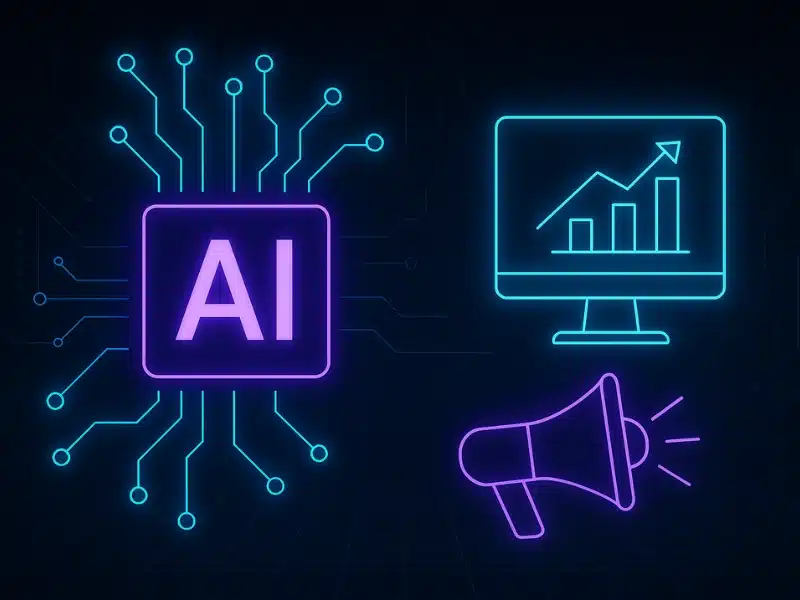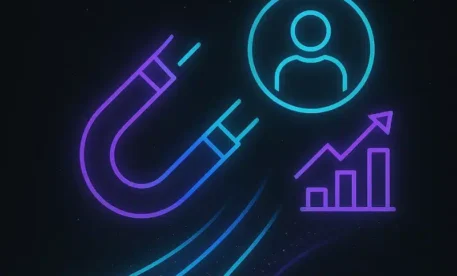Artificial intelligence (AI) has become a transformative force in the business world, and marketing is no exception. As small business owners face increasing competition and shifting consumer expectations, leveraging AI in marketing can unlock new levels of efficiency, creativity, and effectiveness. From content creation to data-driven decision-making, AI tools like ChatGPT and predictive analytics are no longer optional—they are essential. In this blog, we’ll explore how small business owners can use these technologies to revolutionize their marketing strategies for 2025.
What Is AI in Marketing?
AI in marketing refers to the use of artificial intelligence technologies to optimize and automate vaAI in marketing refers to the use of artificial intelligence technologies to optimize and automate various marketing tasks. These tasks range from analyzing customer data to generating personalized content and predicting future trends. Unlike traditional methods, AI-powered tools allow businesses to work smarter, not harder, by automating repetitive tasks and delivering actionable insights in real time.
Key components of AI in marketing include:
- Natural Language Processing (NLP): Tools like ChatGPT that create conversational, human-like interactions. NLP bridges the gap between human communication and machine understanding, enabling businesses to offer more relatable and intuitive customer experiences.
- Predictive Analytics: Algorithms that forecast consumer behavior based on historical data. These analytics can identify trends that are invisible to human analysts, allowing businesses to prepare for market changes and consumer needs proactively.
- Machine Learning: Adaptive technologies that improve over time with more data input. Machine learning ensures that AI tools become more accurate and effective as they process more customer interactions and historical records.
AI in marketing also empowers small businesses by democratizing access to advanced tools that were once limited to large corporations. Whether it’s personalizing email campaigns or refining advertising strategies, these AI-driven solutions are transforming how businesses connect with their audiences and achieve measurable results.
For small businesses, these tools can level the playing field by providing capabilities that were once reserved for large corporations with massive budgets. Moreover, AI in marketing is scalable, meaning it grows with your business needs, offering solutions that adapt as your customer base expands or shifts. The ability to pivot and remain agile is a crucial advantage in today’s dynamic market environment.
Explore how our SEO services can complement your AI strategy to maximize visibility and engagement.
ChatGPT: Transforming Content Creation and Customer Engagement

1. Generating High-Quality Content
Creating engaging and relevant content is one of the most time-consuming aspects of marketing. ChatGPT, an AI language model, can streamline this process by:
- Writing blog posts, email campaigns, and social media captions tailored to your audience.
- Generating ideas for marketing campaigns or seasonal promotions.
- Crafting product descriptions and FAQs that speak directly to customer needs.
For example, instead of spending hours drafting a holiday email campaign, you can input a few details about your target audience and let ChatGPT generate a polished draft. This allows you to focus on strategy and execution rather than getting bogged down in the writing process.
2. Enhancing Customer Support
Small business owners often struggle to provide 24/7 customer support. ChatGPT-powered chatbots can:
- Handle common inquiries like product availability, shipping details, and return policies.
- Direct customers to specific pages or resources on your website.
- Create a seamless user experience that reduces response times and improves satisfaction.
3. Personalizing Customer Interactions
Personalization is key to modern marketing success. ChatGPT can help small businesses deliver personalized experiences by:
- Tailoring email subject lines and messages based on customer preferences.
- Crafting recommendations for upselling or cross-selling based on past purchases.
Predictive Analytics: Making Data Work for You

While ChatGPT excels in content and interaction, predictive analytics focuses on data-driven decision-making. Here’s how small businesses can leverage predictive analytics to transform their marketing efforts.
1. Anticipating Customer Behavior
Predictive analytics uses historical data to identify patterns and forecast future actions. This can help small businesses:
- Predict which products or services are likely to sell well during specific seasons.
- Identify at-risk customers who may stop engaging with your business and target them with re-engagement campaigns.
- Determine the best times to run promotions or sales.
2. Optimizing Ad Spend
Marketing budgets can be tight, especially for small businesses. Predictive analytics can ensure you get the most out of every dollar by:
- Identifying the most effective channels for your ads (e.g., social media, email, or Google Ads).
- Predicting the lifetime value of customers acquired through different campaigns.
- Automatically adjusting ad bids in real time for maximum ROI.
3. Enhancing Customer Segmentation
Segmentation allows you to target specific groups within your audience. Predictive analytics can:
- Group customers based on behavior, demographics, or purchase history.
- Identify emerging customer segments that you may not have noticed manually.
- Deliver hyper-targeted campaigns that resonate with each segment.
Combining ChatGPT and Predictive Analytics for Maximum Impact

When used together, ChatGPT and predictive analytics can supercharge your marketing efforts by blending creativity with data-driven precision. Here’s how:
1. Personalized Content at Scale
Predictive analytics can identify what type of content will resonate most with your audience, while ChatGPT can generate that content quickly and effectively. For example:
- Use predictive analytics to determine that your audience is interested in eco-friendly products.
- Use ChatGPT to craft blog posts, social media captions, and email campaigns highlighting your eco-friendly offerings.
2. Smarter Campaign Planning
Predictive analytics can highlight trends in customer behavior, and ChatGPT can help you act on them. For instance:
- Predict a spike in demand for a product during the holidays.
- Use ChatGPT to create a promotional campaign emphasizing the product’s benefits and availability.
3. Improved Customer Retention
By identifying at-risk customers with predictive analytics, you can create personalized outreach campaigns using ChatGPT. This combination ensures that your messages are timely, relevant, and impactful.
4. Elevating Brand Voice Consistency

One of the hidden benefits of combining ChatGPT and predictive analytics is maintaining a consistent brand voice across all platforms. Predictive analytics identifies customer preferences, and ChatGPT adapts the tone and messaging to align with those insights. This consistency fosters trust and reinforces your brand’s identity.
Practical Steps to Get Started with AI in Marketing
Implementing AI in marketing may seem daunting, but small business owners can start with these simple steps:
- Define Your Goals: Identify areas in your marketing strategy that could benefit from automation or deeper insights, such as content creation or customer retention.
- Choose the Right Tools: Explore AI tools that fit your budget and needs. For example:
- Use ChatGPT for content and customer interaction.
- Leverage platforms like HubSpot or Google Analytics for predictive insights.
- Start Small: Begin with a pilot project, such as automating email campaigns or using a chatbot for FAQs. Measure the results and expand your efforts as you gain confidence.
- Invest in Training: Familiarize yourself and your team with AI tools to maximize their potential. Many platforms offer tutorials, webinars, and support.
- Monitor and Adjust: Continuously analyze the performance of your AI-driven strategies and make adjustments as needed. AI thrives on data, so the more you refine your approach, the better the results.
- Collaborate with Experts: If you’re unsure where to start, consider consulting with digital marketing experts who specialize in AI-driven strategies. They can provide tailored advice and help you integrate AI effectively into your business.
The Future of AI in Marketing
As we look ahead to 2025, the role of AI in marketing will only grow. Small businesses that embrace AI technologies like ChatGPT and predictive analytics will have a competitive edge, enabling them to connect with customers in more meaningful and efficient ways. By automating repetitive tasks, gaining deeper insights into customer behavior, and delivering personalized experiences, AI empowers small business owners to focus on what matters most: building relationships and growing their brand.
Whether you’re just starting your AI journey or looking to refine your strategy, now is the time to invest in the future. AI in marketing isn’t just a trend—it’s a revolution. Will you be ready?

By taking proactive steps and harnessing the power of AI, small business owners can set themselves apart in an increasingly competitive market. The tools are here, the time is now, and the possibilities are endless. Make 2025 the year you transform your marketing strategy with AI.




